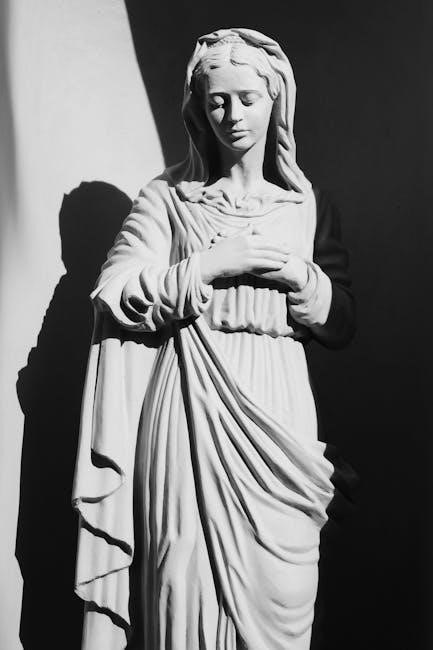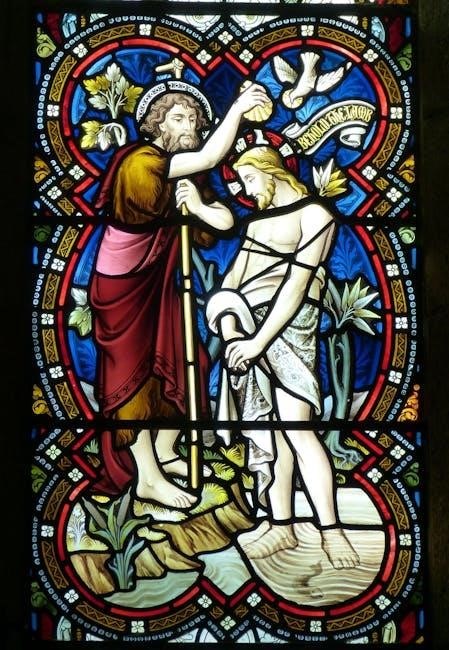
The Gospel of Mary Magdalene is an early Christian Gnostic text‚ offering unique insights into Mary’s role as a disciple‚ emotional connection with Jesus‚ and spiritual leadership‚ challenging traditional views and sparking modern theological discussions.
1.1 Overview of the Gospel and Its Significance
The Gospel of Mary Magdalene is a Gnostic text discovered in 1896‚ providing unique insights into Mary’s prominence as a disciple and her spiritual connection with Jesus. It challenges traditional views by portraying Mary as a leader and a key figure in early Christianity‚ emphasizing her role in spreading Jesus’ teachings after his resurrection. The text also explores themes of spiritual enlightenment and the struggle against patriarchal structures within the early Church. Its significance lies in its alternative perspective on Christian origins‚ making it a vital resource for understanding diverse early Christian thought and its relevance in modern theological discussions.
1.2 Historical Context and Discovery
The Gospel of Mary Magdalene was discovered in 1896 as part of the Berlin Gnostic Codex‚ specifically Papyrus Berolinensis 8502. This well-preserved codex‚ found in Cairo‚ contains Gnostic texts and is one of the earliest known Christian gospels outside the New Testament. Scholars estimate its composition around 150 AD‚ making it a significant artifact for understanding early Christian diversity and the role of women like Mary Magdalene in the spread of Jesus’ teachings‚ challenging traditional narratives and offering fresh insights into the period’s religious dynamics and historical context.

The Discovery and Preservation of the Gospel
The Gospel of Mary Magdalene was discovered in 1896 in Cairo‚ preserved within the Berlin Gnostic Codex (Papyrus Berolinensis 8502)‚ a significant Gnostic text from early Christianity.
2.1 The Berlin Gnostic Codex and Its Importance
The Berlin Gnostic Codex‚ also known as Papyrus Berolinensis 8502‚ is a well-preserved ancient manuscript containing the Gospel of Mary Magdalene. Discovered in 1896‚ it dates back to the second century‚ making it one of the earliest Christian Gnostic texts. Written in Greek‚ the codex provides significant insights into early Christian thought and the role of Mary Magdalene as a prominent disciple. Its preservation has allowed scholars to explore Gnostic theology and the unique perspectives it offers on Jesus’ teachings and the early Christian community‚ making it a vital resource for religious and historical studies.
2.2 The Role of Papyrus Berolinensis 8502
Papyrus Berolinensis 8502‚ a fragment of the Berlin Gnostic Codex‚ is the primary source for the Gospel of Mary Magdalene. Discovered in 1896‚ it is a Greek manuscript dating to the second century‚ providing critical insights into early Christian Gnosticism. Despite its fragmented state‚ the papyrus remains a vital artifact for understanding Mary’s role as a disciple and the theological themes of the text. Its preservation has allowed scholars to study the Gospel in depth‚ while modern digital versions‚ including PDF formats‚ have made it accessible to a broader audience for research and reflection.

Key Themes and Teachings in the Gospel
The Gospel emphasizes Mary Magdalene’s leadership‚ the controversy over women’s roles‚ and Jesus’ emotional connection with Mary‚ highlighting her vision of the resurrected Jesus and spiritual enlightenment.
3.1 The Role of Mary Magdalene in Early Christianity
Mary Magdalene emerges as a prominent leader in early Christianity‚ entrusted with sharing Jesus’ teachings and visions. The Gospel portrays her as a devoted disciple‚ emphasizing her spiritual authority and close relationship with Jesus. She is often depicted as the first to witness the resurrection and spread the news‚ earning her the title of “Apostle to the Apostles.” Her role challenges traditional hierarchical views‚ showcasing women’s active participation in the early Church. This text highlights her significance in transmitting Jesus’ message‚ solidifying her legacy as a key figure in Christian history.
3.2 Jesuss Emotional and Spiritual Connection with Mary
3.2 Jesus’s Emotional and Spiritual Connection with Mary
The Gospel of Mary highlights a profound emotional and spiritual bond between Jesus and Mary Magdalene. She is often depicted as the disciple closest to Jesus‚ receiving visions and revelations that others do not. This intimate connection underscores her unique role as a spiritual confidante‚ emphasizing her ability to understand and disseminate his teachings. The text suggests that Jesus entrusted Mary with special insights‚ further solidifying her importance in the narrative. This portrayal challenges traditional views‚ offering a fresh perspective on their relationship and its significance in early Christian spirituality.
3.3 The Controversy Over Womens Leadership in the Early Church
3.3 The Controversy Over Women’s Leadership in the Early Church
The Gospel of Mary Magdalene sparks debate about women’s leadership in early Christianity. Mary’s prominence as a spiritual leader and her authority in sharing Jesus’ teachings challenge traditional patriarchal structures. The text portrays her as a key figure‚ even surpassing male disciples in understanding Jesus’ message. This has led to discussions about the suppression of women’s roles in the early church and the potential for a more inclusive theological framework. The controversy highlights the tension between Mary’s influence and the hierarchical norms of the time‚ offering a fresh perspective on gender roles in religious leadership.

The Gospel of Mary and Gnosticism
The Gospel of Mary reflects Gnostic beliefs‚ emphasizing secret knowledge and spiritual enlightenment. It portrays Mary Magdalene as a key figure in understanding esoteric truths‚ aligning with Gnostic themes of the soul’s journey toward divine realization.
4.1 Gnostic Influence on the Text
The Gospel of Mary Magdalene exhibits strong Gnostic influences‚ emphasizing secret knowledge and spiritual enlightenment. It portrays Mary as a recipient of esoteric truths‚ aligning with Gnostic themes of the soul’s journey toward divine realization. The text challenges materialism‚ advocating for a direct‚ intimate connection with the divine. Gnostic concepts‚ such as the duality of flesh and spirit‚ are central to its narrative. Mary’s role as a spiritual leader underscores Gnostic ideals of equality and inner wisdom‚ setting the text apart from orthodox Christian traditions and highlighting its unique theological perspective.
4.2 The Concept of Spiritual Enlightenment in the Gospel
The Gospel of Mary Magdalene centers on the theme of spiritual enlightenment‚ emphasizing inner wisdom and direct communion with the divine. Mary receives visions and secret teachings from Jesus‚ highlighting the importance of personal spiritual experience. The text encourages believers to seek truth within themselves‚ rejecting materialism and embracing a mystical understanding of salvation. This focus on enlightenment aligns with Gnostic ideals‚ positioning Mary as a spiritual guide. Her role in conveying esoteric knowledge underscores the Gospel’s message of transcending worldly boundaries to attain divine insight‚ offering a unique path to spiritual awakening.

The Portrayal of Mary Magdalene
Mary Magdalene is depicted as a devoted disciple and leader‚ challenging traditional norms and facing opposition from other apostles‚ showcasing her spiritual strength and influence.
5.1 Mary as a Disciple and Apostle
Mary Magdalene is portrayed as a prominent disciple and apostle‚ demonstrating unwavering dedication to Jesus and his teachings. She plays a pivotal role in spreading his message‚ often displaying a deeper understanding of his spiritual truths compared to other followers. The text emphasizes her authority and leadership‚ positioning her as a key figure in the early Christian community. Her role challenges traditional gender norms‚ highlighting her spiritual equality and influence among the disciples‚ despite facing skepticism and opposition from figures like Peter.
5.2 The Conflict with Peter and Other Apostles
The Gospel portrays Mary Magdalene facing skepticism from Peter and other apostles‚ who question her close relationship with Jesus and the visions she receives. Peter challenges her authority‚ doubting her ability to receive divine revelations‚ reflecting broader tensions over women’s leadership in the early church. Mary defends her experiences‚ emphasizing her spiritual connection with Jesus and the validity of her teachings. This conflict highlights her role as a leader and the resistance she encounters‚ underscoring her unwavering commitment to spreading Jesus’ message despite opposition from male disciples.

The Gospel of Mary and Modern Scholarship
Modern scholars emphasize the Gospel’s significance‚ with recent translations and digital formats like PDFs making it accessible for study‚ while feminist theology highlights its unique perspective.
6.1 Recent Translations and Interpretations
Recent translations of the Gospel of Mary Magdalene‚ including PDF versions‚ have made the text more accessible for modern readers and scholars. A new translation by David Curtis provides a fresh perspective‚ while digital formats allow for easier study and analysis. These interpretations highlight Mary’s spiritual leadership and her unique relationship with Jesus‚ offering insights into early Christian dynamics. The availability of downloadable versions has sparked renewed interest‚ enabling broader discussion and deeper understanding of the text’s significance in religious and feminist scholarship.
6.2 The Role of Feminist Theology in Interpreting the Text
Feminist theology has played a pivotal role in interpreting the Gospel of Mary Magdalene‚ emphasizing her prominence as a spiritual leader and challenging traditional patriarchal narratives. Scholars like Karen L. King highlight Mary’s role as the first apostle and her authority in early Christianity‚ which has been marginalized in mainstream accounts. This perspective underscores the importance of women’s leadership and spiritual equality‚ offering a counterpoint to male-dominated interpretations.
The Gospel of Mary‚ particularly in its PDF versions‚ has become a key text for feminist theological studies‚ inspiring new discussions on gender and spirituality in early Christian communities. It empowers modern readers to reimagine the role of women in religious history‚ fostering inclusivity and challenging outdated hierarchies.

The Gospel of Mary in Popular Culture
The Gospel of Mary Magdalene has inspired various works in popular culture‚ including films‚ literature‚ and music‚ with its themes and characters being widely portrayed and interpreted‚ furthering its accessibility through PDF downloads.
7.1 Literary and Artistic Depictions of Mary Magdalene
Mary Magdalene has been a captivating figure in literature and art‚ inspiring works like Annensky’s poem‚ which explores her emotional depth‚ and Hazel Torres’ book‚ highlighting her spiritual significance. In opera‚ Massenet’s Hérodiade portrays her complex relationship with Herode‚ while Salome’s story intertwines with hers in dramatic performances. Musically‚ artists like Sasha Cooke have brought her story to life‚ and composers like Mark Adamos have created operas centered on her narrative. These depictions reflect her enduring influence‚ blending biblical themes with contemporary interpretations‚ making her a timeless subject in creative expression.
7.2 The Gospel in Film‚ Music‚ and Literature
The Gospel of Mary Magdalene has inspired various artistic adaptations‚ including films‚ musical compositions‚ and literary works. Mark Adamos’ opera‚ The Gospel of Mary Magdalene‚ premiered in 2013‚ featuring Sasha Cooke as Mary and Nathan Gunn as Yeshua‚ exploring her spiritual journey. In literature‚ Hazel Torres’ book highlights Mary’s power and influence‚ while films like Garth Davis’ Mary Magdalene (2018) starring Rooney Mara portray her intimate relationship with Jesus. Musical pieces‚ such as those by Sarah Hart‚ also reflect her emotional depth‚ making her a timeless figure in creative expression and contemporary storytelling.

The Gospel of Mary Magdalene PDF Availability
The Gospel of Mary Magdalene is widely available as a free PDF download‚ with various digital versions accessible through platforms like Google Play and official religious websites.

8.1 Free Downloads and Digital Versions
Free PDF downloads of the Gospel of Mary Magdalene are widely available online‚ offering readers convenient access to the text. These digital versions are often accompanied by translations‚ annotations‚ and scholarly introductions‚ making them valuable resources for both academic and personal study. Platforms like Google Play and religious websites provide downloadable apps and eBooks‚ ensuring accessibility for a global audience. Additionally‚ many websites offer free PDF versions of the gospel‚ catering to those interested in exploring its teachings and historical significance without cost.
8.2 Translations and Editions for Study
The Gospel of Mary Magdalene is available in various translations and scholarly editions‚ facilitating deeper study. Notable translations include those by David Curtis and Karen L. King‚ offering insights into its Gnostic themes. Editions often include annotations‚ historical context‚ and comparative analyses with other early Christian texts. Digital versions provide customizable layouts and search functions‚ enhancing accessibility for researchers. These resources are invaluable for understanding the gospel’s theological implications and its portrayal of Mary as a spiritual leader‚ making it a rich source for academic and personal exploration of early Christianity.

The Historical and Theological Debate
The Gospel of Mary Magdalene sparks debate over its authenticity and implications‚ challenging traditional views of Jesus and early Christianity while emphasizing Mary’s spiritual authority.
9.1 The Gospel as a Challenge to Traditional Views of Jesus
The Gospel of Mary Magdalene offers a unique perspective on Jesus‚ emphasizing his emotional and spiritual connection with Mary. This text challenges traditional views by portraying Jesus as a figure who values intimacy and shared spiritual experiences. It suggests that Jesus entrusted Mary with profound teachings‚ elevating her role beyond conventional narratives. The gospel also questions hierarchical structures within the early Church‚ implying a more inclusive and equitable model of leadership. By highlighting Mary’s prominence‚ the text reimagines Jesus’s relationships and message‚ offering a fresh lens through which to understand his ministry and legacy.
9.2 The Implications for Understanding Early Christianity
The Gospel of Mary Magdalene reshapes our understanding of early Christianity by highlighting diverse perspectives within the faith. Its portrayal of Mary as a key spiritual leader challenges the patriarchal narratives that dominated traditional accounts. The text underscores the importance of spiritual enlightenment and the role of women in spreading Jesus’s teachings. This challenges the notion of a unified early Church‚ instead revealing a complex landscape of theological debates and leadership struggles. The gospel thus offers a more inclusive view of Christianity’s origins‚ emphasizing the coexistence of multiple traditions and voices.
The Gospel of Mary Magdalene remains a vital text‚ offering insights into early Christianity through its PDF availability‚ emphasizing Mary’s leadership and spiritual significance‚ and inspiring contemporary theological discussions.
10.1 The Enduring Legacy of the Gospel of Mary Magdalene
The Gospel of Mary Magdalene has left an indelible mark on religious and feminist discourse‚ challenging traditional narratives and elevating Mary’s role as a spiritual leader. Its themes of spiritual enlightenment and women’s leadership continue to resonate‚ inspiring modern theological discussions and feminist interpretations. As a Gnostic text‚ it offers unique insights into early Christian thought‚ while its availability in PDF and digital formats ensures its accessibility for contemporary readers. The gospel’s emphasis on Mary’s emotional and spiritual connection with Jesus remains a focal point‚ making it a vital text for understanding diverse perspectives within early Christianity and beyond.
10.2 Its Relevance in Contemporary Religious Discussions
The Gospel of Mary Magdalene remains highly relevant in modern religious discourse‚ particularly in feminist theology and discussions about women’s roles in early Christianity. Its themes of spiritual enlightenment and Mary’s leadership challenge traditional patriarchal narratives‚ resonating with contemporary debates on gender equality. The text’s availability in PDF and digital formats has made it accessible to a wide audience‚ fostering new interpretations and discussions. Its emphasis on Mary’s spiritual authority and emotional connection with Jesus continues to inspire scholars and believers‚ bridging historical and modern theological perspectives.



